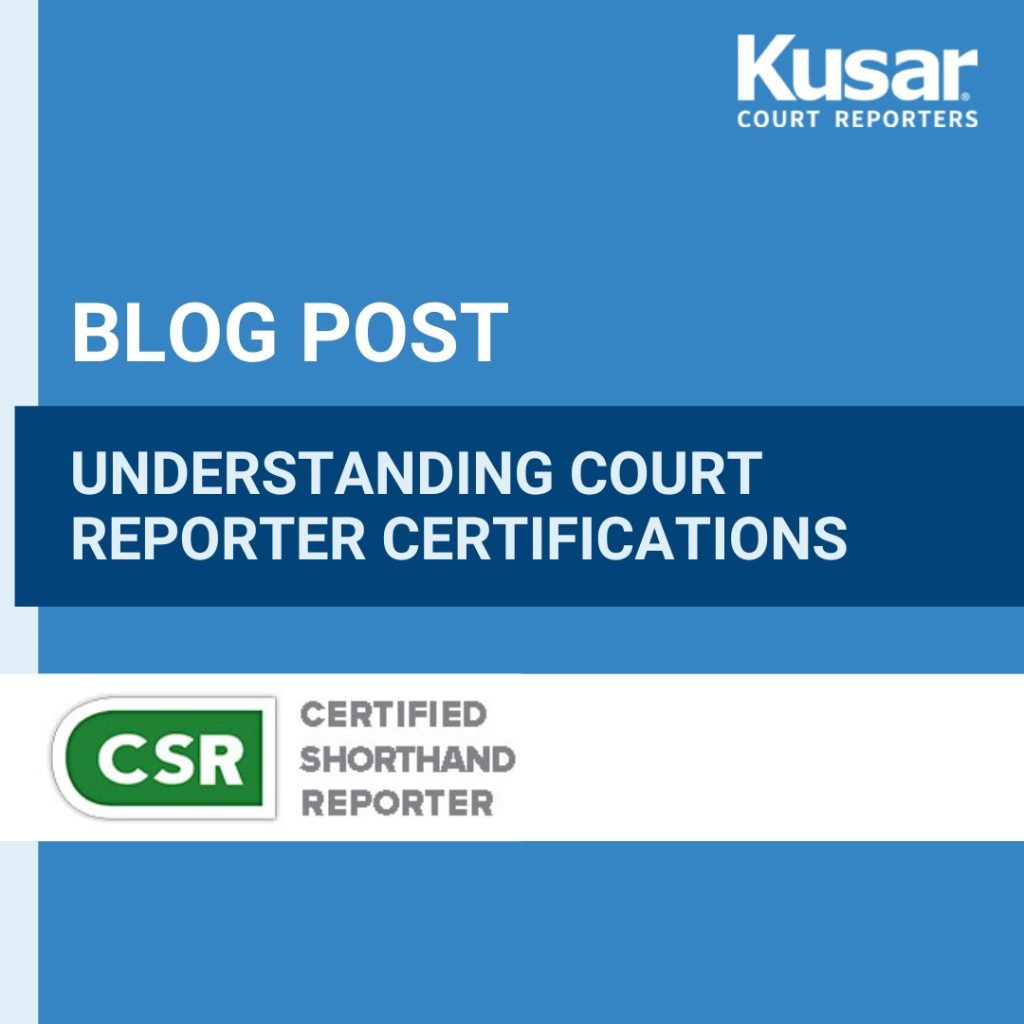
Understanding Court Reporter Certifications
Court reporters have a difficult and extremely important job. To demonstrate their ability to provide an accurate record, they are required to obtain a special certification and/or license. Fulfilling these requirements demonstrates their professional competence. Kusar Court Reporters has a group of well-trained and certified court reporters who meet all of the requirements necessary to serve in this important role. If you are in need of a court reporter, consider contacting our experienced and certified court reporters today at (800) 282-3376.
The Role of Court Reporters
Court reporters serve as the guardian of the record. They ensure that the words of witnesses and parties involved in a court case are properly recorded. Court reporters create transcripts, which provide a written verbatim version of what was spoken in court, at a deposition, or in another setting. These records are relied on to prepare for trial and to file appeals.
Court reporters must be impartial, reliable, and responsible. They must also possess professional competence to perform their important job correctly. To ensure that they have the proper training and skill, many states require court reporters to obtain state certifications.
Court Reporter Requirements
Court reporters are often governed and licensed by a state board. Each state has its own requirements for court reporters. However, the most common requirements to become a court reporter include:
Completion of an Approved Course of Study
The state will typically require that the applicant has completed a course of study that is determined to provide the skills necessary to complete this job competently. The state may even require where the applicant must study and which course they must complete. Some states are more flexible and allow taking an online course to fulfill this requirement.
Passing a Test
The applicant may be required to satisfy requirements for licensure or certification, according to Court Reporter Edu. The test may be specific to the state or a national one that is administered by the National Court Reporters Association.
Depending on the type of certification, the applicant will be required to complete a written examination and a skill test. California has one of the most difficult tests in the Union:
- 4 voice testimony at 200 wpm requiring a passing score at 98.7 % accuracy.
The National Court Reporters Association’s minimum skills standard for machine shorthand are:
- Literary at 180 wpm
- Jury charge at 200 wpm
- 2 voice testimony/question and answer at 225 wpm
Authorization
A judge, the board, or another entity may have to provide official authorization that grants the applicant the ability to begin court reporting in the state. The applicant may have to demonstrate other qualifications, such as minimal education requirements and moral fitness.
Different Types of Court Reporter Certifications
There are different types of court reporter certifications, including:
Certified Stenographic Reporter
A certified shorthand reporter (CSR) is certified to record depositions and court proceedings by utilizing a stenographic machine and to certify court proceeding and deposition transcripts. A certification is required by passing the registered professional reporter (RPR) skills examination, which tests on question responses, literary phrases, and jury charge material and requires a speed of up to 225 wpm, or the passing of an accredited school in the state in order to test for a CSR license in the State of California.
Certified Stenomask Reporter
A certified stenomask reporter (CSMR) is certified to record depositions and court proceedings by utilizing a stenomask recorder and to certify court proceeding and deposition transcripts. The method of qualifying to take the State of California CSMR test requires passing the certified verbatim reporter skills examination administered by the National Verbatim Reporters Association.
Registered Merit Reporter
A registered merit reporter must pass the RMR test and general knowledge tests about court reporting practices, technology, and professionalism. They must also score 240 wpm or above on speed skills tests.
Certified Realtime Reporter
Certified real-time reporters (CRR) have extra skills in instant voice-to-text transcription. They must pass a test in which they accurately transcribe in real time up to 200 wpm.
Certified CART Provider
Communication access real-time translation (CART) is assistive technology that helps hearing-impaired individuals to read testimony in real time. CCP certification requires the provider to deliver real-time reporting in special software at speeds between 180 to 225 wpm.
Court reporters may also be required to complete continuing education credits, so they are apprised of the latest developments in the field. Kusar Court Reporters always maintain their professional credentials.
What Is the Difference Between a Stenographer and a Court Reporter?
The primary difference between court reporters and stenographers is the amount of education required. Becoming a court reporter typically requires between two and four years of education from an institution approved by the NCRA, and then passing a certification test, whereas stenographers need not obtain any certification or licensure. Although many stenographers may also boast this skill set, it is a prerequisite of earning certification as a court reporter. Despite the apparent congruence between the two professions, court reporters generally have additional duties and more options. Thus, a court reporter is always a stenographer, but a stenographer isn’t always a court reporter.
Contact Kusar Court Reporters for Help with Your Reporting Needs
If you are looking for a court reporter with the necessary credentials to record testimony in local, state, or federal cases, the reporters at Kusar Court Reporters have a variety of court reporter certifications and experience to fulfill these needs. Consider contacting us by calling us at (800) 282-3376. You will learn what makes us different.

